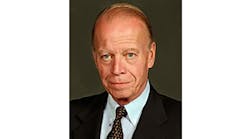Feb. 5, 2004 -- More than ten years after the automotive industry was sued by the Lemelson Medical, Educational & Research Foundation, Limited Partnership, for patent infringement for the use of bar code and machine vision systems brought a federal judge in Nevada has ruled that the Lemelson patents on bar code reading and machine vision were not valid and not enforceable.
The suit, brought by seven manufacturers of bar code and machine vision systems, challenged the validity of the Lemelson patents.
In 1999 Symbol Technologies; Accu-Sort Systems Inc.; Intermec Technologies Corp., a wholly owned subsidiary of UNOVA Inc.; Metrologic Instruments Inc.; PSC Inc.; Teklogix Corp., wholly owned U.S. subsidiary of Teklogix International, Inc.; and Zebra Technologies Corp. jointly filed suit in federal court in Nevada against the Lemelson Partnership seeking a declaration that certain patents asserted by the Lemelson Partnership against end users of bar code equipment were invalid, unenforceable and not infringed. In 2000, the case was consolidated with a similar case filed by Cognex Corp., a maker of machine vision systems.
Chief Judge Philip M. Pro of the United States District Court for the District of Nevada, on January 23, 2004, ruled in favor of their patent lawsuit against the Lemelson Foundation. The ruling was the result of a 27-day bench trial held November 2002 to January 2003.
At issue is whether, in 1954, Lemelson's initial disclosure did, or even could have, contributed to the machine vision and bar code technologies in common use today. The court testimony disclosed the fact that an "ordinary individual" with "skill in the art" at the time could not have used information disclosed in the Lemelson patent application to develop a working system. This wording is critical to interpretation of patent claims. This led, in part, to Judge Pro’s ruling that the patent claims in U.S. Patent 4,511, 918 (issued to Lemelson in 1985) – and all subsequent claims based on that patent – were "unenforceable" and that Cognex and Symbol Technologies products did not infringe.
In fact, certain claims in the ‘918 patent, filed in 1972, had previously been anticipated in a 1965 patent issued to a different inventor.
The court also found that the claims of the 1954 patent were not similar to the means used by bar code readers or machine vision systems produced by the plaintiffs. Judge Pro found that Lemelson had not provided, in his original application, a sufficient written description to adequately describe any system that might be construed as a bar code or machine vision system as they are known today.
In his ruling, Judge Pro noted that there had been an 18-39 year delay between the original patent filing (in 1954) and subsequent applications that more clearly pointed to bar code and machine vision systems.
Judge Pro found no evidence to support the assertion that the 1963 patent claims (and those subsequently based on the 1963 application) were based on the 1954 filing. This meant that the "clock" started at the time of each subsequent application, not the earlier date.
Judge Pro noted that, "…in the intervening years, machine vision and bar code technology was developed by many who had never heard of the Lemelson patents."
"At a minimum," the ruling stated, "Lemelson’s delay…amounted to ‘culpable neglect’ as he ignored his duty to promptly secure his invention."
Whether or not the Lemelson Foundation will appeal is unclear. Nonetheless, this ruling represents a significant victory for the users of bar code and machine vision systems.
Manufacturers have asserted all along that the Lemelson Foundation’s attempts to secure royalties from users of the technology were based on invalid patent claims. This ruling seriously weakens the legal grounds on which the Foundation has based its lawsuits and should help put an end to a long and costly series of legal claims.
Lemelson Patent Background
Jerome Lemelson, who died in October 1997, was one of this century's most prolific inventors. With over 500 patents to his credit few other individuals have ever had more U.S. patents issued to them. Among these patents are claims on bar code reading and machine vision.
The Lemelson Foundation, which has carried on the legal battle for royalties on Lemelson’s patent claims, has historically sued the users of bar code and machine vision technology, claiming that, Lemelson felt the beneficiaries of what were claimed as Lemelson’s inventions should pay royalties. The Foundation has historically not targeted the manufacturers which, in Lemelson’s view, were other "inventors" and "innovators" and should not be penalized.
In 1992, the automotive industry settled with the Lemelson Foundation after a federal judge dismissed the industry’s arguments against the Foundation and Lemelson’s claims.
In legal terms, a Continuation-in-Part (CIP) offers an inventor a way to secure protection for enhancements or improvements to the original invention. A Continuation allows an inventor to broaden the scope of the original claims.
All of the subsequent applications have been CIPs or Continuations of the 1954 or 1963 patent applications.
An earlier trial, in which Ford Motor Company defended itself against infringement claims by Lemelson was based on arguments similar to those in the Symbol Technologies et al. suit. At issue was whether there had been "undue delay" in the issuance of Lemelson's patent such that they (and other companies) had broadly implemented technology thought to be in the public domain. In legal terms, this is a defense based on the use of "laches."
"Laches" are also sometimes called "submarine" patent. The assertion is that an inventor uses delays and continuations to intentionally keep a patent hidden for years while manufacturers develop and implement a technology or application. Then, once the technology is fully developed and widely implemented, the patent suddenly "surfaces."
In June, 1995 Magistrate Phyllis Halsey Atkins in the U.S. District Court for the District of Nevada found in the Ford suit that "Lemelson’s use of continuation applications has been abusive and . . . he should be barred from enforcing his asserted patent rights on the basis of "laches." Lemelson filed for reconsideration.
In April 1997 Judge Lloyd George, Chief U.S. District Judge of the Nevada District Court, granted Lemelson’s appeal, reversing Judge Atkins In his opinion, Judge Atkins held that there was no legal precedence for the "submarine patent" defense stating that "while Lemelson’s use of the continuation process may have exploited an open area of patent practice, the court should not intervene in equity to regulate what Congress has not. . . . this case presents circumstances that could invite revisitation of the statutory rights here involved by the appropriate legislative authority…."
In his ruling, however, Judge Pro cited, "The prejudicial effect of Lemelson’s failure to assert his claims without unreasonable delay is that suffered by the public and, privately by Symbol Technologies, Cognex and others."
That being the case, Judge Pro stated that, "Application of the defense of ‘laches’ is…warranted in this case…." He goes further, stating that, "If the defense of prosecution laches does not apply under the totality of the circumstances presented here…the Court can envision few circumstances under which it would."
AIM, Inc. is the global trade association and recognized worldwide authority on automatic identification, data collection and networking in a mobile environment. AIM members are providers and users of technologies, systems and services that capture, manage and integrate accurate data into larger information management systems. As a not-for-profit industry organization, AIM’s mission is to stimulate the understanding, adoption and use of technology by providing timely, unbiased, commercial-free news and information.
For more information, contact the AIM office at AIM, Inc. at 125 Warrendale-Bayne Rd., Ste. 100, Warrendale, PA 15086, Phone: +1-724-934-4470, Fax: +1-724-934-4495. For direct online access to AIDC information, or additional support, access the AIM Web site at www.aimglobal.org
Additional References
Accu-Sort Systems Inc.: www.accusort.com
Cognex Corp.: www.cognex.com
Intermec Technologies Corp.: www.intermec.com
Metrologic Instruments Inc.: www.metrologic.com
PSC Inc.: www.pscnet.com
Symbol Technologies: www.symbol.com
Zebra Technologies Corp.: www.zebra.com


